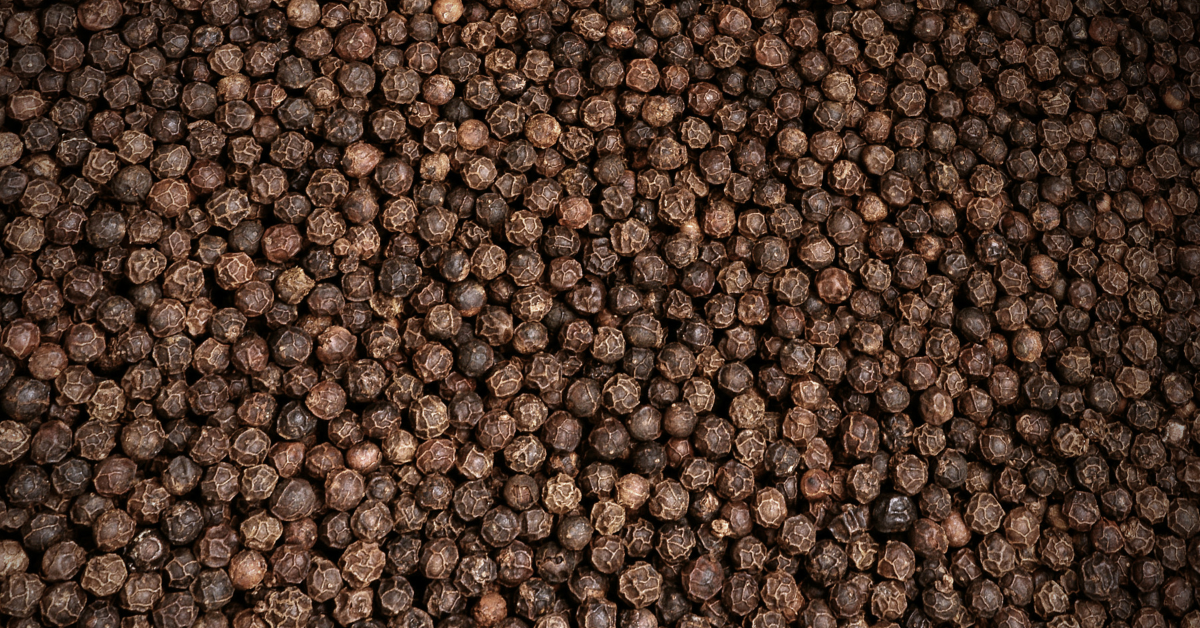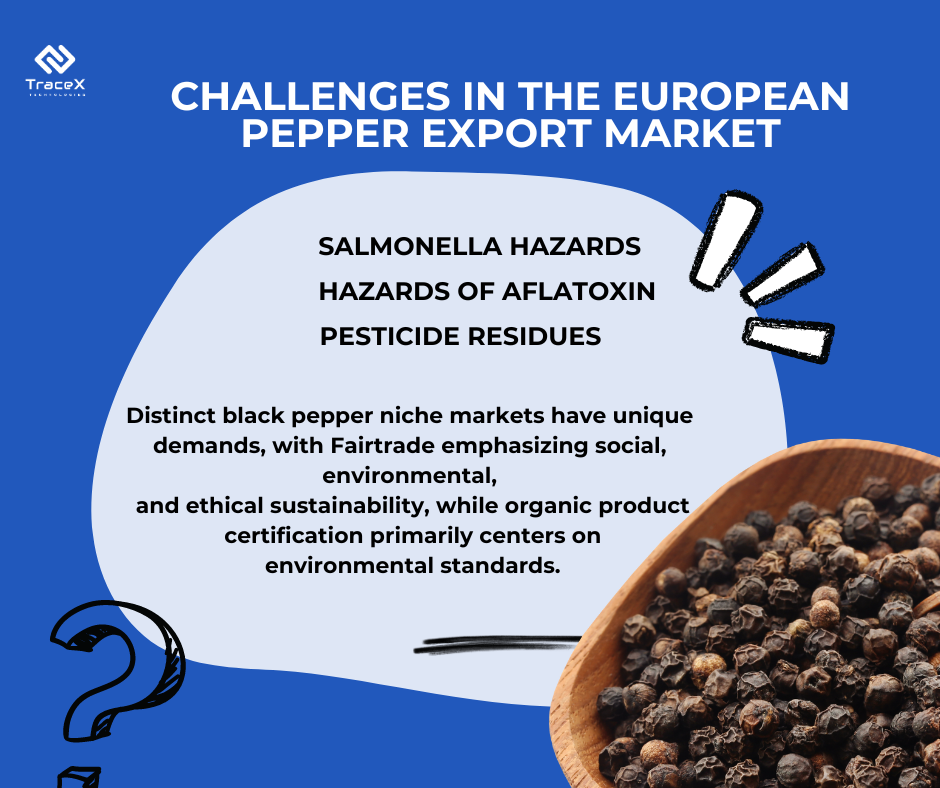Contact: +91 99725 24322 |
Menu
Menu
Quick summary: Unlocking the secrets of spice with Pepper Traceability! Explore the journey from farm to table, ensuring transparency and sustainability. Discover how TraceX revolutionizes pepper traceability for a future of responsible sourcing. Dive into the world of black gold, where every peppercorn tells a story.

Embark on a journey through the fascinating world of pepper traceability, where the origin, cultivation, and supply chain of this universal spice come under the spotlight. From farm to table, trace the intricate path of peppercorns and discover how transparency is enhancing quality, sustainability, and ethical practices in the global pepper trade.
Pepper is said to be the “king of spices” because its usage round the world is more than any of the spices present.
Unveil the secrets behind the peppery goodness in your kitchen, exploring how innovative traceability solutions are revolutionizing the pepper industry. In this blog. delve into the nuances of pepper traceability and savor the story behind each dash of flavor in your favorite dishes.
Black pepper has woven itself into the fabric of history, an integral and intriguing spice. Wars were waged, alliances formed and shattered, and treaties sealed or betrayed, all in pursuit of this coveted spice. Originating from the lush rainforests along the Malabar coast, pepper earned its title as the ‘king of spices.’ Its scarcity bestowed upon it an air of exoticism and mystique, contributing to its global fame and enduring legacy.
Pepper, also known as black pepper, is derived from the dried berries of the Piper nigrum vine and is renowned for its pungent flavour. Major pepper-producing countries include India, Vietnam, Indonesia, Brazil, and Malaysia. The industry encompasses cultivation, harvesting, processing, and export of pepper. The demand for pepper is driven by its extensive use in culinary applications worldwide. Pepper is not only a staple spice but also valued for its medicinal properties. The industry faces challenges such as price volatility, weather conditions affecting crop yield, and international trade dynamics. Continuous efforts are being made to enhance cultivation techniques, ensure sustainable practices, and meet quality standards. The pepper industry plays a crucial role in global spice markets, contributing to diverse culinary traditions and economies.
Indonesia ranks as the second-largest producer of black pepper (Piper Nigrum L) globally, following Vietnam and trailed by India, Brazil, and Malaysia. Although Vietnam leads in black pepper production, Indonesia holds the distinction as the largest producer of white pepper. With a global production averaging 3,50,000 to 4,00,000 tonnes annually, India contributes significantly by producing approximately 2,60,000 tonnes per year, accounting for approximately 75% of the total world pepper production.
Pepper vines, reaching up to 10 meters in height, thrive by establishing roots wherever nodal shoots touch the ground. Bearing fruit from the fourth or fifth year, these vines, with their green, wide-leaved tendrils, produce cylindrical clusters of berries known as peppercorns. These small fruits feature a thin skin, a single large seed, and minimal flesh. The heat or pungency in pepper arises from the presence of piperine in the corn.
Nursery to farms
Pepper vine harvesting commences in February and March, with skilled workers meticulously handpicking every corn from the plantation. These workers, extensively trained in safety protocols, ensure that only the highest quality corns are selected during the harvesting process.
Processing and Grading
Dried and washed peppercorns are transported to our fully mechanized certified units for further processing and grading.
Spice Traceability encompassing the capacity to follow a product’s journey from ‘farm to fork,’ is crucial for ensuring food safety and operational effectiveness. In the event of an issue, traceability aids in identifying the source and understanding the potential impact. Aligned with the UN’s Sustainable Development Goal SDG12, Responsible Consumption and Production, traceability holds increasing significance, offering potential benefits for smallholder farmers and other stakeholders in the supply chain. The lack of transparency in supply chains often impedes companies from making genuine environmental or social impact assessments.
Traceability systems assist in quickly identifying and resolving problems in the face of outbreaks of disease, concerns about food safety and an increased emphasis on quality, thereby reducing the effects on patients and the industry. Furthermore, traceability aids with sustainability initiatives by encouraging ethical sourcing methods and minimizing environmental impact. The need for traceability is growing as customers become more aware of the products they buy, which is motivating industry innovation and partnerships to build strong traceability systems throughout the agriculture sector.
Blockchain is a decentralized and secure digital ledger technology that enables transparent and tamper-resistant record-keeping. Its role extends across various industries, offering transparency, traceability, and efficiency in transactions. Blockchain ensures trust through its decentralized nature, reducing the need for intermediaries.
Technologies like QR codes and RFID (Radio-Frequency Identification) are frequently utilized for tracking and identification. RFID simplifies logistics and inventory management by using radio waves to transfer data from tags to readers. However, information is stored in a two-dimensional barcode that cell phones can read thanks to QR codes. These technologies improve productivity and give users and businesses alike rapid access to information in a variety of applications, including supply chain management, asset tracking, contactless payments, and product identification.
Connecting commonplace items to the internet so they can send and receive data is known as IoT (Internet of Things) device integration. This network of connections improves data collecting, automation, and real-time monitoring in a number of industries. IoT applications range from smart homes and wearable devices to industrial sensors and smart city infrastructure, fostering improved efficiency, informed decision-making, and innovative services
For the indigenous communities worldwide, pepper is not just a condiment—it is a livelihood, a climate protector, and a preserver of biodiversity.
Some traditional peppercorn farming methods contribute to soil degradation, landscape erosion, and water pollution, impacting both nature and communities. Adopting sustainable agriculture practices, such as cultivating pepper in fallow land without chemical fertilizers, becomes a crucial solution. This approach not only ensures Indigenous communities’ livelihoods by enhancing pepper crop resilience but also addresses the challenges posed by climate change.
Sustainable initiatives foster collaborations between farmers and markets, creating new avenues for locally sourced pepper sales. The benefits extend beyond economic gains; they positively impact the environment. Initiatives like those by WWF-Malaysia introduce practices like replacing chemical fertilizers with compost and animal manure, promoting soil fertility while reducing water pollution and sequestering carbon.
Introducing inter-cropping among pepper plants reduces erosion, enhances soil fertility, acts as natural pest control, and fosters biodiversity by providing shade and shelter. The second crop not only adds to farmers’ income but also contributes to overall sustainability. Sustainable pepper farming utilizes fallow lands, eliminating the need for clearing new areas. This practice, coupled with preserving surrounding rainforests, plays a vital role in promoting biodiversity and building resilience against climate change, offering realistic alternatives to deforestation.
The combination of food safety certification and regular, dependable laboratory testing presents a favourable image for pepper exporters to the European market. Emerging suppliers stand to gain additional advantages by embracing sustainable production practices and adhering to corporate social responsibility standards.

TraceX blockchain traceability solutions revolutionize pepper traceability for companies. By leveraging blockchain technology, TraceX ensures an immutable and transparent ledger, enabling seamless tracking from pepper cultivation to the end product. This enhances supply chain visibility, ensuring authenticity, quality control, and compliance with global standards. Companies benefit from real-time data, mitigating risks, boosting consumer trust, and fostering sustainability in the pepper industry. TraceX empowers companies to make informed decisions, creating a traceable and accountable pepper supply chain.
TraceX is revolutionizing pepper traceability by collaborating with organizations across the supply chain. Leveraging cutting-edge blockchain technology, TraceX ensures a tamper-proof and transparent record of each pepper’s journey from farm to fork. By working closely with pepper producers, processors, and distributors, TraceX facilitates seamless data sharing and real-time visibility, enabling stakeholders to trace the origin, processing, and distribution of pepper with unparalleled accuracy.
Transparency in the supply chain is being revolutionized by advances in tracking technologies. Real-time tracking of product travels is made possible by advanced tracking solutions like RFID, GPS, and blockchain, which guarantee precise data on origin, manufacture, and distribution. These innovations create a new era of traceability and accountability across a range of industries by improving accountability, decreasing fraud, and satisfying customer demands for reliable and sustainable sourcing.
The goal of international agricultural traceability programs is to improve supply chain transparency and food safety. In cooperative endeavours, cutting-edge technology like RFID and blockchain are deployed, enabling agricultural products to be tracked in real time. Governments and international organizations are supporting these initiatives, which advocate for uniform traceability systems to increase accountability, reduce risks, and guarantee the authenticity of agricultural products in the global market.
In conclusion, the evolution of pepper traceability marks a pivotal shift toward a more transparent, sustainable, and consumer-centric pepper industry. Embracing cutting-edge technologies, such as blockchain and IoT, alongside robust sustainability practices, promises to reshape the narrative of pepper sourcing. The commitment to traceability not only ensures the authenticity and quality of pepper but also empowers consumers to make informed choices aligned with their values. As the pepper industry progresses, fostering collaboration among stakeholders, adhering to certification standards, and meeting rising consumer expectations will be paramount. Through traceability, the pepper supply chain can navigate the challenges of today and pave the way for a responsible, resilient, and traceable future.
